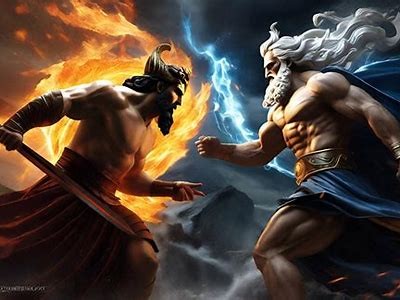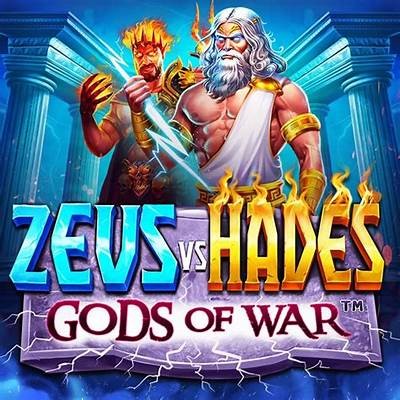Who Would Win in a Battle Between Zeus and Hades in Greek Mythology?
Introduction
The concept of gods battling one another is a fascinating topic in Greek mythology, particularly when it comes to the siblings Zeus and Hades. Both figures are powerful deities who play critical roles in the pantheon of ancient Greece, yet they govern distinctly different realms. This article will explore their unique powers, the dynamics of their relationship, and attempt to answer the intriguing question of who would prevail in a direct confrontation. Zeus, often referred to as the king of the gods, is the deity of the sky and thunder. As the ruler of Mount Olympus, he governs over the other gods and holds dominion over numerous elements of nature. With an array of powers and weapons, including the iconic thunderbolt, Zeus has displayed remarkable authority and command over weather phenomena, making him a formidable opponent in any situation. His extensive influence also extends into human affairs, as he was believed to uphold justice and maintain order among mortals. In contrast, Hades is the god of the underworld, ruling over the realm of the dead. Although he often gets overshadowed by Zeus, Hades' domain is just as significant in the grand scheme of mythology. He governs the souls of the departed, and his realm, known as the Underworld or Hades, is where all mortals eventually end up. Armed with the Helm of Darkness, which grants him the power of invisibility, Hades possesses unique advantages that make him a challenging opponent. One of the most significant aspects of Zeus' powers lies in his control over lightning. The ability to summon thunderstorms, hail, and tornadoes grants him an arsenal of natural phenomena that could be leveraged in battle. Furthermore, Zeus has great physical strength, longevity, and can transform into various forms, allowing him to adapt to different combat scenarios. His authority as a king among gods also allows him to inspire loyalty from other deities, who could join him in battle. On the other hand, Hades possesses powers that are quite different but equally formidable. He commands the dead, which means he can summon souls to aid him in battle. His ability to control the realm of the Underworld includes various creatures, including Cerberus, the three-headed dog, who serves as his guardian. Moreover, the Helm of Darkness not only grants him invisibility, but also empowers his attacks, allowing him to launch surprise assaults. Hades' intimate knowledge of death and the afterlife could manipulate the psychological aspects of combat. Zeus and Hades share a complex relationship as brothers, often characterized by rivalry and familial loyalty. Following their victory over the Titans, the brothers divided the cosmos among themselves—Zeus took the sky, Poseidon received the seas, and Hades was granted the Underworld. The separation of their domains often creates an underlying tension, as each deity must assert their influence within their own sphere while navigating their relationships with one another.
Allies and Enemies
While they may be rivals, it is crucial to note that their interactions can also serve to unite them against greater threats. For instance, during times of turmoil in the mortal realm or when external enemies arose, such as the Titans or even giants, both brothers would unite forces. This cooperation underscores a sense of shared power and mutual respect, even if a battle between the two would be an extraordinary event.
The Scenario of Their Battle
Setting the Stage
To comprehend the potential outcome of a fight between Zeus and Hades, one must consider the battlefield. A confrontation on Mount Olympus, home to Zeus, would likely favor him due to his intimate connection with the environment and its potential for chaos. In contrast, a battle in the depths of the Underworld would heavily benefit Hades, who commands every aspect of that realm. Each god would be in their element, and the terrain would play a significant role in determining the outcome.
Initiating Combat
A hypothetical battle could be initiated by various circumstances—perhaps a personal feud, a challenge for supremacy, or even a misunderstanding. Zeus, quick to assert his power, might wield his thunderbolts, commanding storms to rage against Hades. In return, Hades would likely use his wronged souls and the creatures of the Underworld as tactical allies. With his Helm of Darkness, he could avoid direct confrontation while summoning his forces to create diversions and overwhelming Zeus.
The Clash: Strengths and Weaknesses
Zeus’ Strengths
In a direct clash, Zeus would thrive on his unmatched power over the weather and his commanding physical presence. His ability to produce lightning bolts from the sky provides him with long-range attacks that could strike Hades from a distance. Additionally, Zeus' natural authority could empower allies and enhance their fighting capabilities, improving teamwork and strategic advantages during combat.
Hades’ Strengths
Hades, while possibly less physically imposing than Zeus, brings the benefit of control over death and moral ambiguity to his strategy. Invoking spirits and ancient creatures, he could potentially create a battleground overwhelmed with chaos. His understanding of the mental state of his opponents and his use of invisibility techniques could allow him to confuse Zeus, leading to effective surprise attacks.
Possible Outcomes and Theories
The Power of Nature vs. The Rule of Death
The battle’s outcome may hinge on the philosophical juxtaposition between the power of nature and the inevitability of death. Zeus represents creation, sustenance, and order, while Hades embodies death, the afterlife, and the unknown. Whether Zeus' might would triumph over Hades' cunning and psychological warfare remains a topic of speculation.
Alliances and Betrayals
It is feasible that other gods could play a role in this battle—either joining forces or causing further discord. The dynamic between Zeus and Hades would depend on their alliances, as gods often shift loyalties. If support came from the likes of Poseidon or Athena, the tide of battle could change, favoring the god with the strongest alliance.
Cultural Significance
Myths and Lessons
The stories of Zeus and Hades, particularly in the context of their rivalry, impart important lessons about power dynamics, sibling relationships, and ancient beliefs regarding life and death. They serve to illustrate the balance that exists in the mythological realm—each deity's strength also reflects a corresponding weakness. Discussion of their battle encourages deeper reflection on the nature of power itself, both divine and mortal.
The Legacy of Their Mythology
Today, the tales of Zeus and Hades continue to be told, inspiring adaptations in literature, film, and other forms of media. The ongoing exploration of these characters not only entertains but also invites audiences to ponder their own relationships and ethical dilemmas surrounding power and mortality. Perhaps the true victory lies not in the outcome of a battle, but in the enduring legacy of their stories.
Conclusion
Ultimately, the question of who would win in a battle between Zeus and Hades remains open to interpretation. Debates over their strengths and weaknesses, strategic advantages, and the environment in which they battle serve to enrich our understanding of Greek mythology. Regardless of the outcome, the clash between such formidable brothers underscores timeless themes of power, rivalry, and the inevitable dance between life and death.





